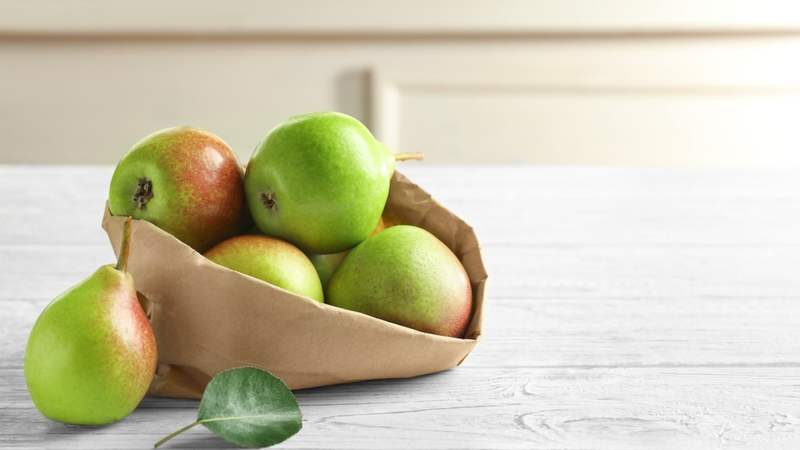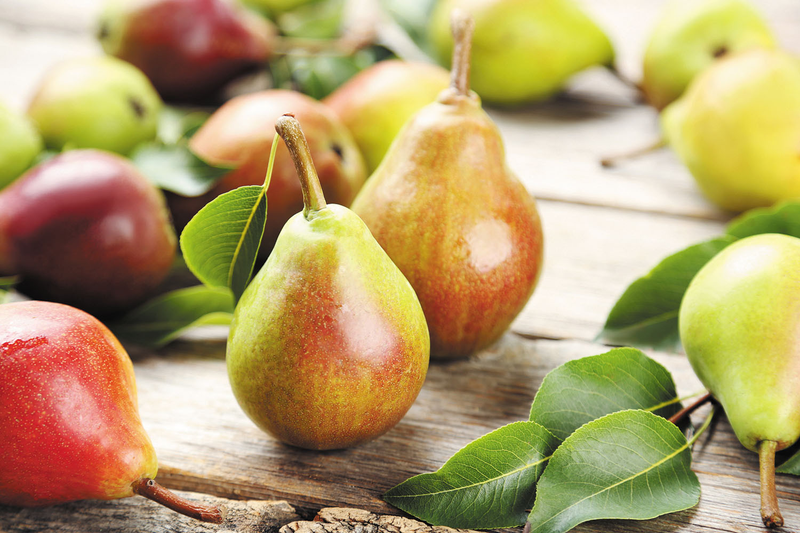South African pear is a fruit that many people love because of its natural sweet and crunchy taste. In this article, we invite you to explore the wonderful uses that South African pear brings to health and beauty.
South African pear is also known as South African green pear or South African pink-cheeked pear, which has a smaller fruit size than regular pears and a slightly yellowish green or light pink skin. To learn more about the uses of South African pear, you should not miss the information shared below.
Characteristics of South African pear
South African pear is also known by many different names based on the external characteristics of this fruit, such as South African green pear or South African pink-cheeked pear. This is a perennial fruit tree belonging to the Pyrus genus. South African pear trees are found in many temperate climates and often bear fruit in winter, autumn and summer.

South African pear is also known as South African green pear, South African pink-cheeked pear.
The South African green pear has a round, slightly flat body, the average weight of each fruit is about 350 – 500g/fruit and has a smooth skin, when the fruit is ripe it will turn brown or yellow-green, sometimes with a light pink color, so it is also called the South African pink-cheeked pear.
The flesh of the South African pear is white, juicy, crispy and sweet with a slightly sour taste and a characteristic mild aroma. Thanks to its delicious flavor, South African pears are widely used to make food, jam, drinks, dried, tea, juice, smoothies, cakes, fruit salads, etc.
Nutritional value of South African pears
Similar to many other types of pears, the main ingredient of South African pears is water and many nutrients necessary for the body, including vitamins, minerals, fiber, etc. According to nutrition experts, each South African pear (about 178g) can provide the body with:
- 101 calories;
- 1g protein;
- 27g carbohydrates;
- 6g fiber;
- 12% DV vitamin C;
- 6% DV vitamin K.
In addition to the above substances, South African pears can also provide small amounts of important substances such as folate, vitamin A, niacin, antioxidants, minerals such as copper, zinc, potassium, … to support a healthy body, enhance metabolism and nutrient absorption.
Health benefits of South African pears
According to research, pears in general and South African pears in particular have many good effects on health and beauty. Specifically, the benefits of South African pears include:
Good for eyes and skin
South African pears are a rich source of nutrients with high levels of lutein and zeaxanthin compounds, which help improve eyesight and reduce the risk of eye problems such as macular degeneration, cataracts, refractive errors, etc. Not only that, these nutritional components of South African pears are also very good for the skin thanks to their ability to effectively prevent aging, reduce wrinkles and prevent sagging.

South African pears are rich in vitamin A which is good for eyesight.
Enhance anti-inflammatory ability
Experts say that the habit of eating pears regularly helps the body receive the necessary amount of flavonoids, vitamin C and vitamin K, thereby increasing resistance, supporting effective anti-inflammation, including diseases related to chronic inflammation.
Prevent cancer
Sharing about the uses of South African pears, nutritionists say that each South African pear contains many powerful antioxidant compounds such as anthocyanin and cinnamic acid – 2 compounds proven to have the ability to fight dangerous cancer cells, including lung cancer, stomach cancer and bladder cancer.
In addition, for women, the antioxidants in South African pears also help protect health, reducing the risk of breast cancer and ovarian cancer.
Reduce the risk of diabetes
Each South African pear of about 176g can provide up to 6g of fiber – a fairly impressive number compared to many other fruits. Thanks to its high fiber content, South African pears also help the digestive system work more effectively, reducing the rate of sugar release into the blood, thereby regulating blood sugar levels and keeping blood sugar levels stable. Therefore, people with diabetes can also eat South African pears in moderation to help control disease symptoms.

Weight loss
Pears in general and South African pears in particular are listed as low-calorie and high-fiber fruits that are very good for women’s weight loss. The abundant fiber content found in South African pears will make you feel full longer, thereby minimizing hunger leading to snacking and uncontrolled weight gain. Also thanks to the weight loss support effect, eating South African pears properly also helps you control the risk of obesity, fatty blood, etc.
Rich in antioxidants
Nutritional studies show that South African pears contain high amounts of vitamin C, polyphenols, phenolic acids, phytochemicals and flavonoids, which can help prevent the appearance of health problems and diseases. In fact, many studies have also demonstrated that the body’s antioxidant capacity when eating pears with the skin regularly increases much higher than that of the group of subjects who eat pears without the skin. The antioxidants in South African pears also help prevent high blood pressure, stroke and many other dangerous diseases.
Contribute to the treatment of diverticulitis
Diverticulitis occurs when a bulging pouch in the lining of the large intestine (diverticula) develops and leads to infection and inflammation. South African pears contain abundant fiber that improves digestion. A study has also shown that consuming at least 30g of fiber per day reduces the risk of diverticulitis, which is also one of the benefits of South African pears.

According to nutritionists, regularly eating pears is very good for patients with diverticulitis.
Enhance body detoxification
Pears provide many antioxidants, vitamin C, vitamin K to help protect the body against free radical attacks, thereby enhancing the effectiveness of eliminating harmful toxins from the body. Free radicals can form cancer cells, so supplementing antioxidants is an effective way to prevent cancer.
South African pears are not only delicious, naturally sweet and crunchy, but also bring countless benefits to health and beauty. When choosing to buy South African pears, you should prioritize choosing fruits with a certain level of gloss, feel firm when held, not crushed or showing signs of damage, … to enjoy the sweetest South African pears.





